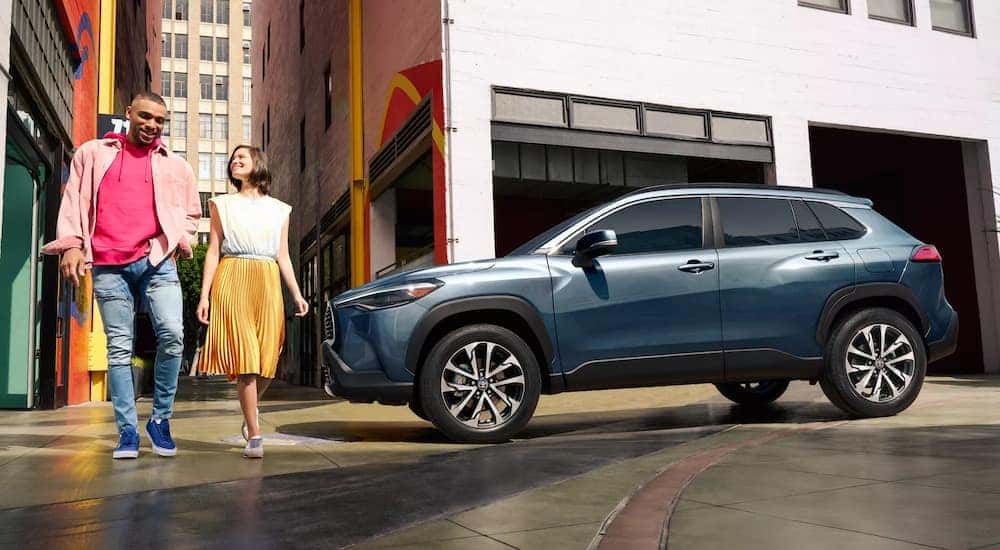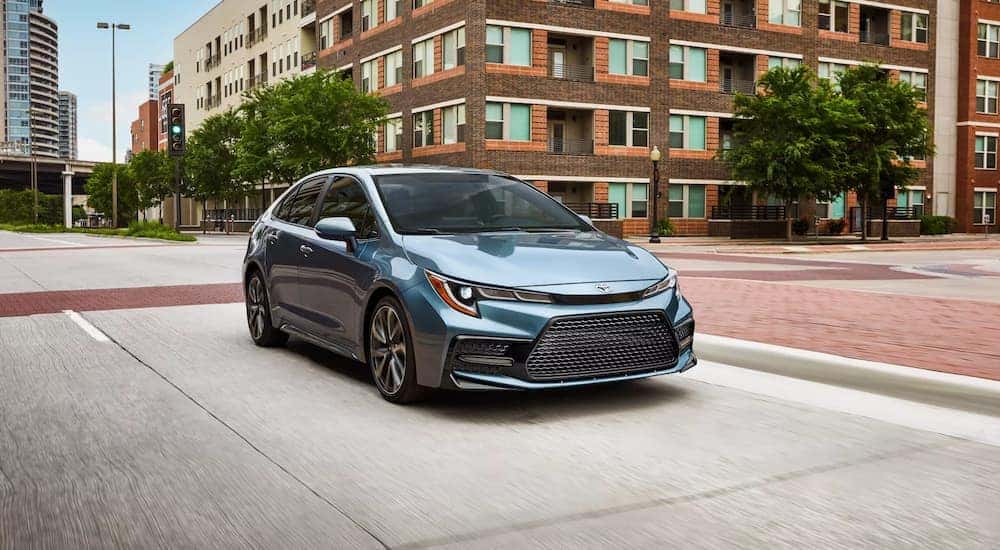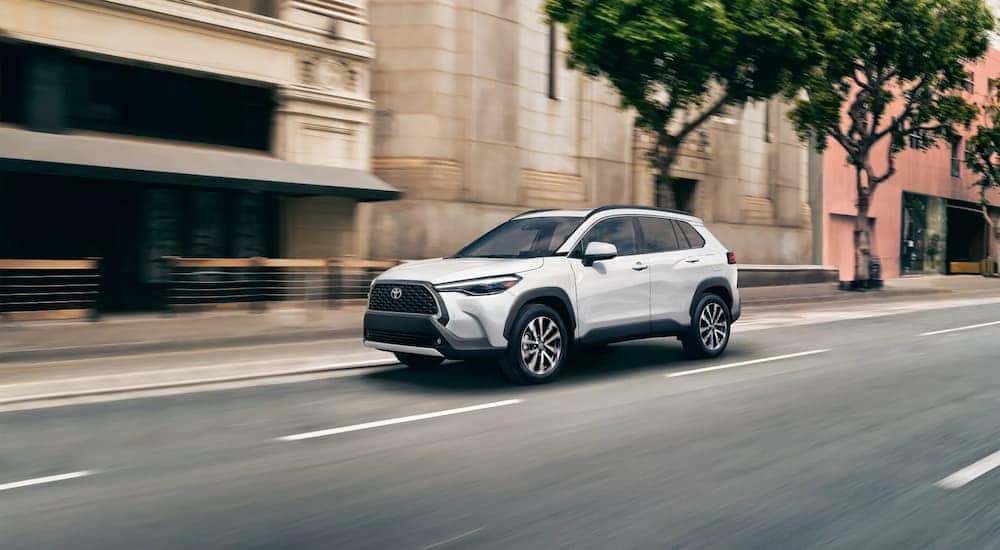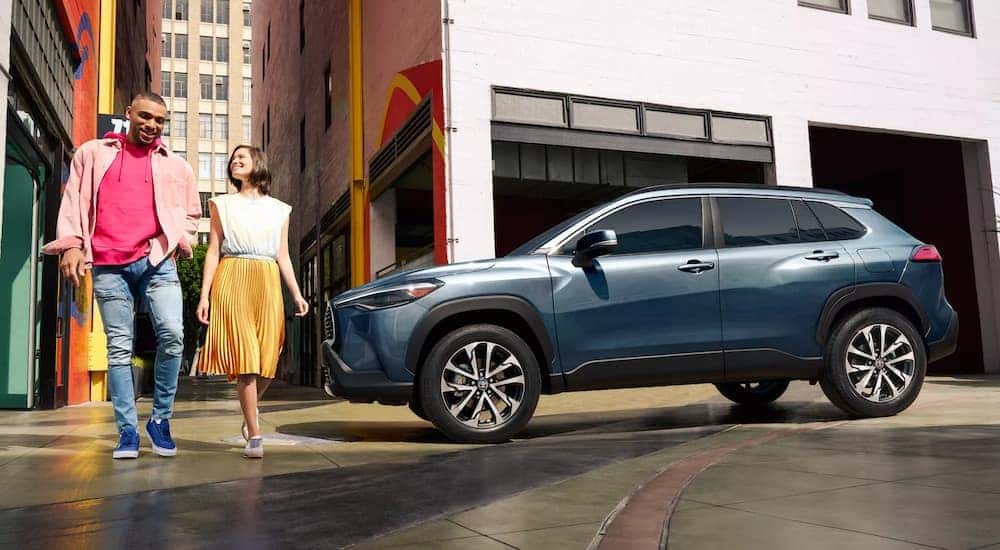Toyota Corolla vs Toyota Corolla Cross: What Are the Differences?

The Toyota Corolla has been around for decades, selling big numbers and moving lots of units around the world. Recently, Toyota decided to take the Corolla platform and expand it into uncharted territory with the Corolla Cross. Why is it uncharted territory? Well, because the Corolla has traditionally been a sedan, but the new Corolla Cross is a subcompact SUV. This isn’t the only difference between these two models, and as your Toyota dealer in Sinking Spring, we understand what these two models are truly offering and can help you choose the best one for your needs.
It’s more than just a nameplate change and a few exterior modifications. Toyota really decided to approach the Corolla Cross in a different way and for a different segment of the car-shopping demographic. But what specifically makes the Corolla Cross unique or different from the standard Corolla? Is the Corolla Cross right for you? Let’s get into it to find out.
Compact Sedan vs Subcompact Crossover SUV
The most important and defining difference between the Toyota Corolla and the Toyota Corolla Cross is the categories that they each fit into. The Corolla is a compact sedan, which you can get as a traditional sedan or a hatchback. The Corolla Cross literally lives up to its moniker as a crossover in the subcompact SUV segment. So they are in two completely different categories, offering potential shoppers something unique within their respective segments.
The Corolla is also available as a hybrid, featuring a combustion and electric engine to reduce emissions and increase fuel economy ratings. The Corolla Cross makes its North American debut with a combustion engine. However, some regions have already received a hybrid model for increased fuel economy and lowered emission ratings, and we expect it won’t be too long before that option is available to us.
Interestingly enough, both vehicles are actually built on the same modular platform, sharing the unibody Toyota New Global Architecture design, abbreviated as the TNGA-C classification. This platform has been in use since the 2016 model year of the fourth generation Toyota Prius. Even though both the Corolla and Corolla Cross are on the same design platform, they have some startling differences in terms of what you can expect from their offerings.

Corolla vs Corolla Cross: Size Differences
Since both vehicles are classified in different segments, it means that they have different sizes. The TNGA-C platform allows for extended wheelbases and frame heights, as evident with the subcompact and compact crossovers available on the platform. In the case of the Corolla and Corolla Cross, the Corolla actually has a wheelbase that is 3 inches longer than the Cross, with the former measuring in at 106.3 inches and the latter measuring in at 103.9 inches.
However, the Corolla Cross is larger in various other key areas, including having more height on the Corolla by 8.3 inches. This actually translates into several interior and exterior differences, with the Cross having slightly more headroom than its sedan counterpart. Interestingly enough, though, the Corolla does offer a couple of inches more shoulder and hip room than the Cross, so there is a give and take in terms of interior cabin sizes.
The height differences play into the traversal capabilities as well. The Cross has more ground clearance, with the standard Corolla measuring 5.3 inches of clearance and the Cross topping out at 8.1 inches. Of course, if you want the sportier capabilities of the Corolla Cross to venture over terrain that demands more ground clearance, it does provide the advantage in this area.
Corolla vs Corolla Cross: Fuel Economy
When it comes to size differences, one of the changes you can expect to see manifest is in the fuel economy. As you know, size, height, and weight changes in a vehicle will determine what sort of fuel economy it achieves, in addition to the powertrain configuration. Even though both vehicles are available with a 2.0-liter 4-cylinder, the smaller size of the Corolla compared to the Corolla Cross nets it better overall gains with fuel efficiency.
The Corolla is available with both a 1.8-liter 4-cylinder and 2.0-liter 4-cylinder, both of which achieve roughly 30-31 miles per gallon in the city and around 38-40 miles per gallon on the highway. The 2.0-liter 4-cylinder for the Corolla Cross manages 31 miles per gallon in the city and an estimated 33 miles per gallon on the highway. This is to be expected from a subcompact crossover SUV, as they are known for getting better fuel mileage than larger midsize or full-size SUVs but still trail behind subcompact and compact sedans.
This feeds into the advantages of different segments appealing to different customer bases. Some people might prefer the size of the Corolla Cross and its ride height and sports-utility qualities, while others might prefer the smaller size of the Corolla and its fuel economy ratings. This gives everyone a little bit of something different to look forward to from both vehicles depending on what shoppers desire from an automobile.

Corolla vs Corolla Cross: Performance/Drivetrain
The Corolla and Corolla Cross have identical performance capabilities when it comes to the 2.0-liter inline 4-cylinder that’s standard in the Cross and available for the Corolla. The 4-cylinder produces up to 169 horsepower and 151 pound-feet of torque in the Corolla with 1 lb-ft of torque less in the Corolla Cross. The powertrain here is identical, including featuring dual variable valve timing with intelligence, usually abbreviated to VVT-i. This helps with the aforementioned fuel economy ratings for both vehicles.
The big difference between the two is that the Corolla has an additional powertrain as part of its line-up. In addition to the 2.0-liter, there is the 1.8-liter 4-cylinder dual-overhead-camshaft with 16-valves and Valvematic technology designed to help it achieve those impressive fuel economy ratings. The 1.8-liter 4-cylinder comes with 139 horsepower and 126 pound-feet of torque.
Another difference between the two is that even though both come with continuously variable transmissions, the Corolla Cross is available in both front-wheel and all-wheel drive, whereas the Corolla is only available in front-wheel drive. Of course, while all-wheel drive helps with stability management and light off-road traversal, it does impact the overall fuel economy ratings. So this is another thing to consider between the two.
Corolla vs Corolla Cross: Buyer Preference
There really is no such thing as one Corolla variation being better than the other. It all boils down to what shoppers are looking for out of a vehicle and what they want to drive. Inside, you have access to the same infotainment and connected service features, as well as the robust Toyota Safety Sense, so you’re not giving up anything essential going with one vehicle over the other. The major differences boil down to size, performance, and fuel economy.
Depending on what you’re looking for out of a vehicle should determine which one you might prefer. Do you plan on driving off the road into campsites or vacationing in wilderness areas? The Corolla Cross with its all-wheel drive configuration might be the better option. Do you commute to work with long drives on a day-to-day basis or just need a vehicle for basic errands? Both vehicles will save you a lot in the fuel economy department while checking off all the essentials as far as performance is concerned. However, if you just need a quick errand car, the Corolla’s slightly lower price may be appealing.
Ultimately, in the Corolla vs Corolla Cross debate, you want something that suits your lifestyle and budget. So you should weigh what benefits you most and your driving habits, as well as what you expect to use the vehicle for. This way, the next time you visit us at Performance Toyota, you’ll have an idea of which version of Toyota’s popular Corolla nameplate will be at the top of your must-buy list.



